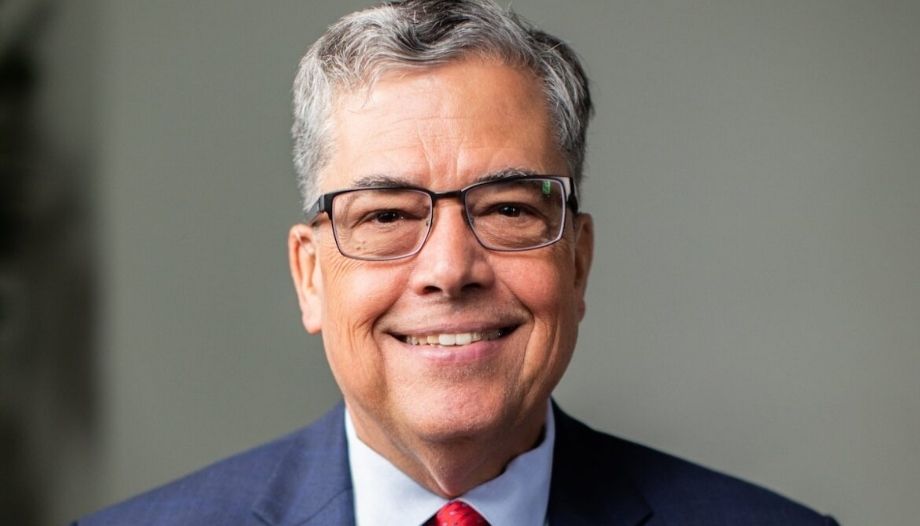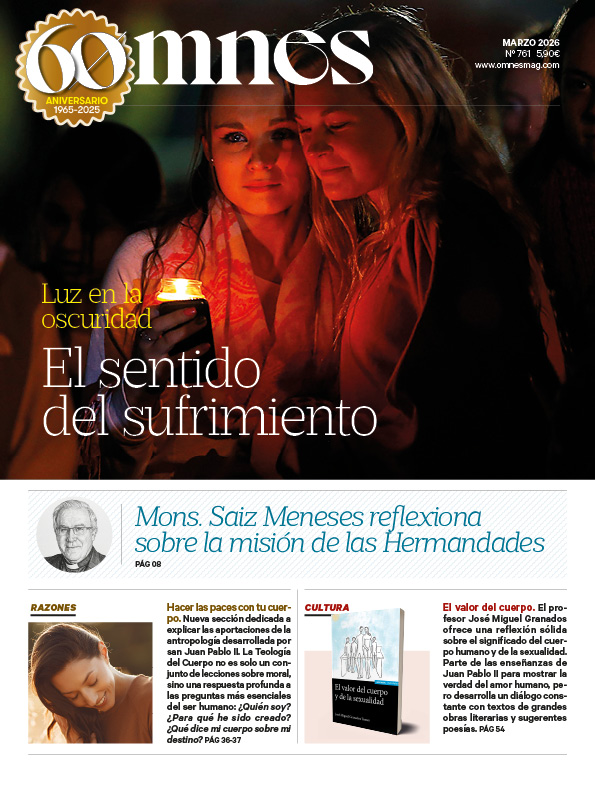- Charlie Camosy
Catholic identity, current challenges, its growth, the challenges of artificial intelligence (AI). These are just some of the topics discussed by Peter Kilpatrick, president of the Catholic University of America (CUA) with Charles Camosy of OSV News. Here are his reflections.
Charles Camosy: Can you give us a short version of the journey that led you to become president of The Catholic University of America?
Peter Kilpatrick: I have been an academic my entire adult life, starting as a professor of chemical engineering at North Carolina State University in 1983, and eventually assuming leadership positions as I was asked for increasing authority. Including department head, center director, dean of engineering at Notre Dame, and chief academic officer and chancellor of the Illinois Institute of Technology from 2018-2022.
I had planned to retire then, at age 66, and a good friend at Notre Dame contacted me to consider the presidency of The Catholic University of America. I must admit I had some convincing to do. But after visiting The Catholic University of America, the interview trip and meeting our extraordinary students, faculty and board members, I was interested.
I feel that my entire professional career and my deep and abiding commitment to my Catholic faith (I converted at age 25 during my graduate studies) have prepared me for this. In fact, I feel that Our Lord has been preparing me for this my entire life. It is a great privilege and honor to serve this remarkable institution.
Some irresponsible behaviors
Camosy: For some time now, we have heard many warnings about the crisis in higher education. What do you think about the positioning and capacity of the Catholic University of America to respond to the challenges of higher education?
Kilpatrick: Higher education has long been under fire, with many members of the cultural and business community claiming that we are not adequately preparing young people to thrive in a rapidly changing culture and business environment.
Many people believe that universities have been part of the problem by promoting ideologies that undermine human development. Others believe they have been irresponsible in allowing young people to borrow heavily to study at their institutions, knowing that their indebtedness would pose a serious challenge.
So, in many ways, some of the challenges facing higher education have been self-inflicted. And they are the result of irresponsible behavior on the part of "some" universities (I could name them, but that would be uncharitable).
Overbuilt
Camosy: Some other challenge....
Kilpatrick: Another major challenge in higher education is that, as in many industries, we have overbuilt in response to a strong demand for U.S. higher education that is now declining.
Certainly, from the 1950s through at least the 1990s, U.S. universities were the envy of the entire world. It was relatively easy to generate tuition revenue, often by enrolling a percentage of international students. Who, on average, would pay considerably more for tuition than domestic students.
Foreign countries responded by creating their own universities. So now there are many very prestigious universities (at least in the secular world) in China, Korea, Singapore, Japan, India, Brazil, Chile, Mexico, Canada, Australia and, in fact, all over the world.
Demographics and other factors. Trends
At one time, there were more than 7,000 institutions of higher education in the United States. This, coupled with the country's declining birth rate and the demographic shift of fewer children in affluent families, has led to the current crisis.
In the future, the universities that will thrive and succeed will be those that clearly distinguish themselves in the marketplace and offer unique programs that are perceived (and actually are) of great value. We have done this in several of our schools and programs.
Strengthening our Catholic identity
Our Columbus School of Law has moved from 122nd to 71st in the national rankings in just two years (2023 to 2025). This has been due in large part to a deliberate decision to strengthen our Catholic identity and mission with the creation of three new centers in the last decade. The Center for Religious Liberty, the Center for Law and the Human Person, and the Center for Constitutionalism and the Catholic Intellectual Tradition. These programs have attracted truly outstanding young faculty to our faculty and have sparked interest nationally.
Our Conway School of Nursing has risen to 28th in the national rankings (from 54th just a year ago), largely due to its focus on training nurses in the image of Jesus Christ as Healer or Divine Physician. In addition, the School of Nursing has developed unique and engaging simulation-based programming and clinical experiences that few (if any) other schools can offer.
I could cite many other examples, including our schools of philosophy, theology and business. This is the future of our university.
Camosy: Can you tell us more about The Catholic University of America's commitment to the fullness of its Catholic mission and identity? How does this manifest itself?
KilpatrickAs mentioned above, we are fully committed as "the" Catholic University of America. Based on our founding mission, we are a source of light and inspiration to the world of higher education.
This implies being excellent and differentiated in our academic offerings, being clearly Catholic and innovative, and also being faithful to the teachings of the Church in matters of faith and morals.
Oath of fidelity
In fact, all our ecclesiastical faculty - those who teach philosophy, theology and religious studies, and canon law - take a public oath of fidelity at the Mass of the Holy Spirit. This is at the beginning of their term of office. And the rector also takes an oath of fidelity. That oath commits me to guarantee fidelity here at the university, something to which I joyfully commit myself.
What excites me is that we can be a university committed to free inquiry and vigorous debate, but also committed to fidelity. Many people in our culture don't understand that the two are not antithetical.
In addition, there are many excellent professors in the United States who wish to engage in teaching, research and scholarship at a faithfully Catholic university that is also intensely engaged in research and scholarship. There are not many options for them, so we are able to recruit outstanding professors for our university.
Ethical orientation of the Artificial Intelligence (AI)
Camosy: I am particularly impressed by your commitment to leading a university where the use of AI is discussed and debated with a distinctly Catholic key. Could you tell us more about your efforts in this regard?
Kilpatrick: Several years ago we made a very conscious decision to strive to be a university that attempts to provide ethical, moral and virtue-based guidance in the use of AI. We partnered with Leidos, the information technology company, to host a conference in April 2022 focused on the design of ethical military AI systems.
Since then, we have organized several additional conferences and roundtables. As an institution, we believe that AI is here to stay. And that universities should strive to articulate appropriate safeguards to prevent the misuse of AI. And perhaps even lobby Congress to pass laws and policies that dictate such measures. It does not appear that many of the technology companies are going to adequately self-regulate.
AI signings
Camosy: They must have had to be reinforced.…
Kilpatrick: To strengthen our capabilities in this regard, we have created a university-wide AI task force, led by our senior vice chancellor for research, Dr. H. Joseph Yost. Dr. Yost has recently created a new Institute for AI and Emerging Technologies, and we have hired a new director for that institute, Taylor Black. Mr. Black is a highly accomplished AI expert who works in Microsoft's Office of the Chief Technology Officer as the Director of AI and Enterprise Ecosystems. Taylor is also studying to become a deacon in the Greek Catholic Church. We are very fortunate to have him join our university.
We have also hired several outstanding professors in the area of AI, including Dr. Hanseok Ko and Dr. Gregorio Toscano, who are helping us build our AI infrastructure. They are working closely with ethicists, moral theologians and others to clearly articulate how AI can and should be used in a virtuous way. In accordance with the recent instruction of the Vatican on IA entitled "Antiqua et Nova".
Finally, our faculty and administrators have played a leadership role in what is called the IA Builders Forum, organized by the Vatican.
—————
Charles Camosy teaches moral theology and bioethics at The Catholic University of America in Washington.
This interview was originally published in OSV News. You can consult it here.
--------








